The 78th Press Conference on Xinjiang Uygur Autonomous Region
(July 22, 2022, Beijing)
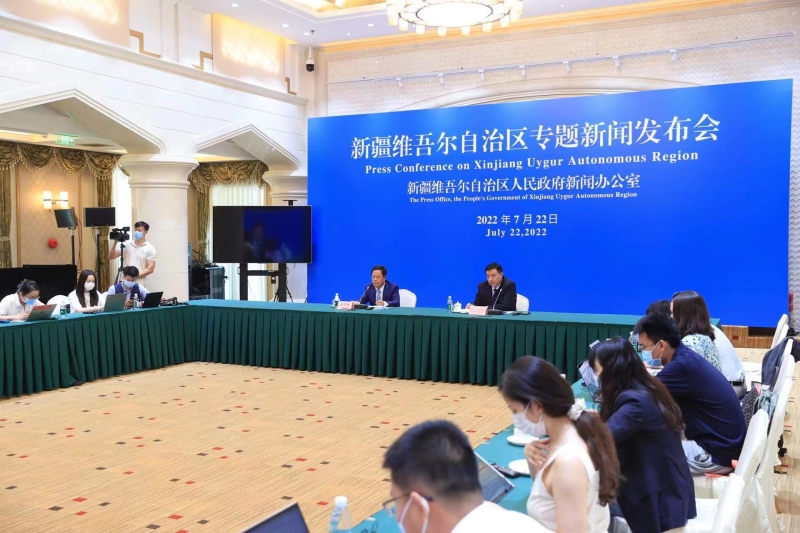
Xu Guixiang: Friends from the media, good afternoon!
Thank you for joining the 78th Press Conference on Xinjiang Uygur Autonomous Region. I am Xu Guixiang, spokesperson of the People’s Government of Xinjiang Uygur Autonomous Region.
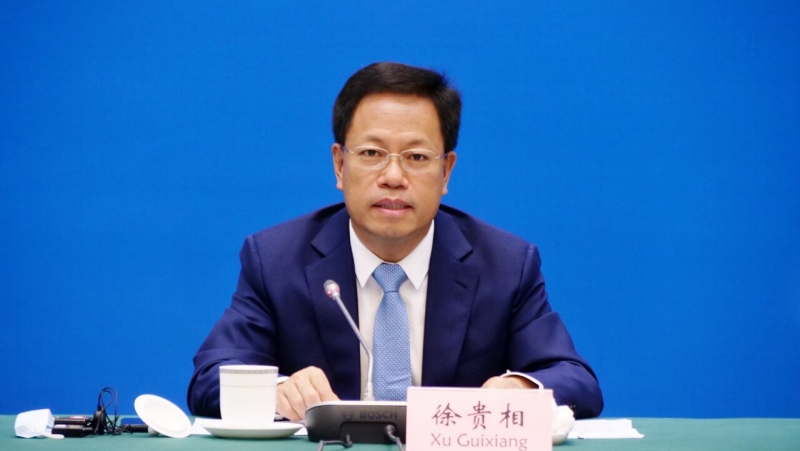
Photo taken on July 22, 2022 shows Xu Guixiang, spokesperson of People’s Government of Xinjiang Uygur Autonomous Region speaks and answers questions at the 78th Press Conference on Xinjiang Uygur Autonomous Region. Photo by Xinjiang Daily/Zheng Zhuo
First, please allow me to introduce the participants to today’s conference. Sitting beside me is Elijan Anayat, spokesperson of the People’s Government of Xinjiang Uygur Autonomous Region. Also joining us via video link are nine representatives from local communities in Xinjiang. They are: Balien Jenes, teacher from the Children's Center of Changji Hui Autonomous Prefecture; Huang Tingting, postgraduate from the College of Life Science and Technology, Xinjiang University; Yusup Ghojiabdulla, villager from Jay Township, Yutian County who is now working in Wuhan; Liang Qiang, Manager of Jincheng Restaurant in Changji City; Osman Mamat, Deputy Director of the Department of Medical Affairs, Xinjiang Children’s Hospital; Ma Lianhua, resident of Gongyuan Community, Dubieke Subdistrict, Tacheng City;Dilidar Utigu, worker at Urumqi North Jishun Road Community; Ahmat Ger, villager from Yongku Tuanjie Village, Qiman Town, Kuqa City; Zilayhan Salam, villager from Araymak Village, Yurqi Township, Keping County. In today's press conference we invited some foreign media to participate online and broadcast live to more than 60 countries and international organizations around the world.
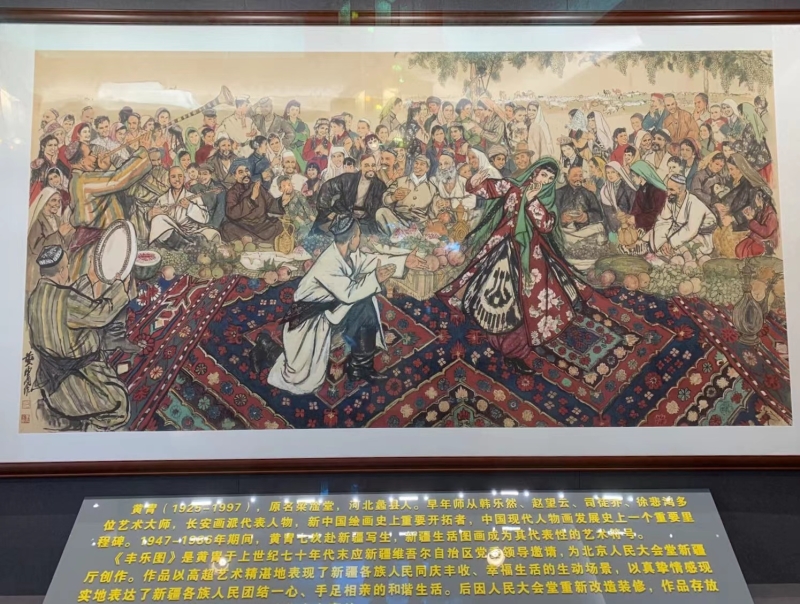
Today’s conference is themed “Ethnic Unity Stories in Xinjiang”. Here, I’d like to show you a Chinese painting named “Joy of Harvest”. It was done in the 1970s by renowned artist Huang Zhou. The original is preserved in Xinjiang Art Museum. It depicts the happy scene where people of all ethnic groups in Xinjiang singing and dancing, celebrating harvest. The painting shows the happy life as well as equality, unity, progress and development enjoyed by people of all ethnic groups in Xinjiang.
Since ancient times, Xinjiang has been home to various ethnic groups. Throughout its long history, the ethnic groups in Xinjiang are like brothers and sisters who work and live together and help each other out, build a beautiful home and create a better future together. All ethnic groups are closely related members of the broader family of the Chinese nation. The Han people cannot live without ethnic minorities, ethnic minorities cannot live without the Han people, and ethnic minorities cannot live without each other. People of all ethnic groups live, work, develop together and enjoy happiness together. We cherish ethnic unity the way we protect our own eyes, and are closely united like the seeds of a pomegranate that stick together.
Next, a piece of video about the spontaneous square dance of people of all ethnic groups in Nanhu Park, Urumqi.
Xinjiang has fully implemented the CPC’s ethnic policies and the system of regional ethnic autonomy. Local regulations, such as the Regulations of Xinjiang Uygur Autonomous Region on the Work of Ethnic Unity and Progress, have been enacted. It has unrelentingly promoted ethnic unity and progress to foster a strong sense of community for the Chinese nation, and carried out ethnic solidarity campaigns and taken various measures to promote interaction, exchanges, integration between different ethnic groups and to foster a strong sense of community for the Chinese nation.
On the contrary, racial discrimination continues to rise in the US. Racial hatred is tearing the American society apart. While the yelling of African American young man, Freud "I can't breathe" is still echoing, yet another tragedy happened when African American young man Jayland Walker was killed by over 90 shots fired by eight policemen. There are exactly the evil result of the aggravating “white supremacy”, “great replacement theory” and other forms of systemic and prevalent racial discrimination in the US. As a party to the UN International Convention on the Elimination of All Forms of Racial Discrimination, the US is yet to take effective measures to redress systemic racism, which is an infringement on ethnic minorities’ human rights and a serious violation of the US’s obligations under the convention. Some American politicians do not face up to their own problems, but spare no effort in smearing ethnic unity in Xinjiang. This is so hypocritical and ridiculous.
Like the roots of pine trees in the Tianshan Mountains, people of all ethnic groups in Xinjiang remain closely to each other. Next, representatives from local communities in Xinjiang will share their stories of ethnic unity.
Balien Jenes: Hello everyone. My name is Balien Jenes. I’m a dance teacher at the Children’s Center of Changji Hui Autonomous Prefecture. I’m of Kazak ethnicity, and I’m 26 years old. I graduated from Xinjiang Art College with a degree in dancing. I have been teaching dancing for eight years.
Standing behind me are the students I’m teaching. They are of Han, Hui and Kazak ethnicity. The kids learn to dance during the summer holiday. A variety of dances are taught in their class, including Uygur, Kazak, Dai dances as well as yangge of the Han people in Jiaozhou. Learning different dances enables the kids to learn different ethnic cultures. They can learn from each other and grow together in an atmosphere of art.
They are now practicing basic moves of Uygur dances, which have a happy rhythm to be enjoyed by kids. It seems kids from Xinjiang are born to dance. Despite their young age, they are already good at many types of dances.
This is Wang Luna, 10, a girl of Hui ethnicity. She likes dancing very much, and has practiced dancing for over four years. She’s really good at dancing, and very attentive in class. She’s taken part in many contests, and won a lot of awards. Every kid in the class likes her.
And this is Elina, 8, of Kazak ethnicity. She speaks perfect mandarin. She enjoys helping other classmates. When some kids cannot do a move, she’ll show to them. She’s also very popular in the class.
The students are very active. They play games together after class, and share with each other toys and snacks.
Kids wear uniformed dancing suits, shoes and stockings, so they won’t feel restrained when doing the moves. The classroom is very large, with thick cushions laid on the floor and a large mirror, from which kids can see themselves from every angle. There are also facilities like computers, loudspeakers, a projector and a screen, providing students with a better learning environment.
The Children’s Center of Changji Hui Autonomous Prefecture has opened classes for electric piano, drawing and taekwondo, all enjoyed by children of all ethnic groups. Many of them will sign up during winter or summer holidays.
Next, the kids will perform a dance for you. Please enjoy.
That’s all from me. Thank you.
Huang Tingting:Hello, everyone. My name is Huang Tingting, a postgraduate student majoring in microbiology, College of Life Science and Technology, Xinjiang University, grade 2021,I’m of Han ethnicity, from Ili Kazak Autonomous Prefecture.
Zhang Jiaxue: Good afternoon. I am Zhang Jiaxue from the College of Life Science and Technology in Xinjiang University, majoring in microbiology. I’m of Han ethnicity, from Ili Kazak Autonomous Prefecture.
Hamida Alip: My name is Hamida Alip from the College of Life Science and Technology, Uygur, from Qitai, Xinjiang.
Ayshamgul Matrozi: My name is Ayshamgul Matrozi from the College of Life Science and Technology. I am Uygur, and my hometown is Yutian County, the home of jade. In August 2016, four girls with high hopes from different parts of Xinjiang came to 2016-Class 1 in the College of Life Science and Technology, Xinjiang University. Huang Tingting and Zhang Jiaxue are from Ili, a place famous for magnificent scenery. Hamida is from the ancient city of Qitai. Although we are from different places and ethnic groups, we share the same goal and ambition, which is to finish our studies and build Xinjiang into a better home. Through our own efforts and mutual help among roommates, all of us achieved outstanding academic results in four-year college life. We were granted graduate school entrance without examination and met each other again in Room B225, Building 2, Boda Campus of Xinjiang University. where we started our life as postgraduates.
Zhang Jiaxue: We four met in undergraduate studies and became friends in postgraduate studies. We get along well with each other in the homey dorm room, which gives us a sense of belonging. We accompany and encourage each other, and make progress together. Hometown development and future plans are our frequent topics. We often go to class and the library together, discuss our studies and inspire each other. We clean our room together to keep it tidy. When we return school after holidays, we share the specialties of our hometown with other. I still remember when we met difficulties in the lab, we would work it out together by sharing experience without reservation. These petty things in life are reflections of our confidence in and care with each other. Our roommates will always be the motivation and support for more progress.
Hamida Alip: To meet each other is fantastic and to know each other is wonderful. Although we are from different places, we get along well with each other. We respect each other like a family. In our small family of solidarity and harmony, unity, friendship and love always prevail.
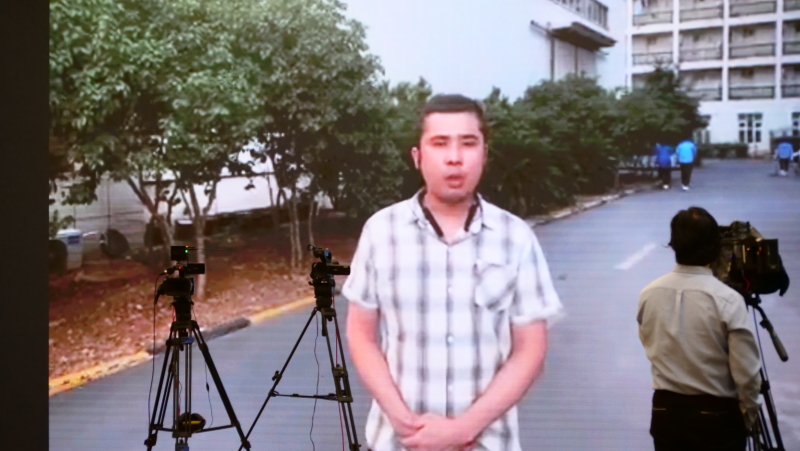
Yusup Ghojiabdulla: Good afternoon. My name is Yusup Ghojiabdulla. I’m now working in a technological company which makes air-conditioners. It’s been three years since I left Xinjiang and started working here.
My hometown is Jay Town in Yutian County, Hotan Prefecture. When I was at school, I used to do farm work with my parents or did odd jobs in the downtown. Watching my parents working so hard without steady income, I decided to work outside and earn more money to change our life. After graduation from secondary vocational school, I noticed this company through my friends. I was attracted by its good salaries and benefits.
In November 2019, I passed the recruitment exams and started working in the company. The company signed a labor contract with me and paid for my pension, medical, unemployment and work injury insurances, along with free health check-up every year. The company also provided us with free accommodation. Our dorm rooms are equipped with bedclothes and wash products, and also air-conditioner, toilet and water heater, making our life very convenient. My roommates and I are living together happily.
I was a little bit worried when I first arrived, because I barely knew anything, and my Mandarin Chinese was poor. The company arranged senior workers to teach us. I made friends with Master Wang, whom I call my elder brother.
Master Wang:The Xinjiang friend beside me is very good. First of all, through his own efforts, he has improved a lot in Mandarin. Now we can communicate freely. Second, he not only improves his working ability, but also unites colleagues. He obeys management, and completes the work with quality and quantity. Third, our relationship is very good. We often work out together.
Yusup Ghojiabdulla: Master Wang is very experienced in the company. At that time I found it hard to communicate because of my poor Mandarin. I couldn’t understand those terms at work. But Master Wang taught me again and again patiently until I got it. I could feel the brotherly care from him. After years of hard work, I am now a senior worker too, and have been promoted to the leader of assembly line. My salary also rose to 4,500 yuan per month.
We have become closer friends after working together for so long. When we get paid, we will ask friends to dine out. They know I am a Muslim, so they ask me to decide where to go and eat halal food with me. They always pay for the bills hurriedly and tell me that since I’m far away from home they should take care of me. While I’m talking to you here, Master Wang is in charge of my work. When we have more time, I often play billiards, cards or visit some scenic spots with my colleagues.
Many working in the company are from my hometown, so the company sets up a halal canteen for us. There are pliaf, lagman noodles, baked bums and pigeon soup. Many Han colleagues also come to the canteen to have a taste of the special foods. We like the holidays most. After Spring Festivals, I bring Xinjiang specialties to my colleagues. They are fond of our nuts, like raisin, badam and fig. They say Xinjiang is truly the hometown of fruits, and that everything is so sweet. They also give me some specialties from their hometowns, such as loquat, waxberry and mangosteen.
On Eid al-Adha and Mid-autumn Festivals, we dine together. The company prepares a lot of delicious foods, like kebab and big-plate chicken. There are also parties organized by the company. I teach my Han colleagues to dance Meshrap, and they teach me to sing songs in Wuhan dialect. Now I even speak Mandarin with some Wuhan dialect. My Han colleagues always greet me with “Yahshimu”, which is standard Uygur.
Big thanks to my colleagues for making me feel like home here. I believe that through my own efforts, I can improve my abilities and make life better. Now, I’m realizing the goal step by step.
Wusman Maimaitti: Hello, everyone. I'm Wusman Maimaitti, the Deputy Director of the Medical Department of the Children's Hospital of Xinjiang Uygur Autonomous Region, and I'm delighted to attend today's press conference. Xinjiang Children's Hospital is a top children's hospital integrating medical treatment, teaching, scientific research, preventive health, and at present, under the custody of Beijing Children's Hospital, it is accelerating the construction of a national Children's Regional Medical Center.At present, there are 574 available beds, with an annual diagnosis and treatment of more than 300,000 patients. There are 874 employees, from 13 ethnic groups such as Han, Uygur, Kazak and Daur, and ethnic minority employees account for nearly 40%. In our hospital, employees of all ethnic groups, doctors and patients help each other and love each other. Everyone is united and harmonious, and is living a happy life. Our hospital is a model of ethnic unity.
Neonatology department is the center of Xinjiang neonatal disease screening and critical neonatal transport and treatment, which is mainly responsible for neonatal disease screening in four prefectures of Southern Xinjiang. In the past 25 years, the department has rescued more than 500 children of Han, Uygur, Hui and other ethic groups through screening, diagnosis, treatment, rehabilitation and follow-up, which has been widely praised. This is a photo of the attending physician of neonatal pediatrics carrying out diagnosis and treatment at the grass-roots level in southern Xinjiang.
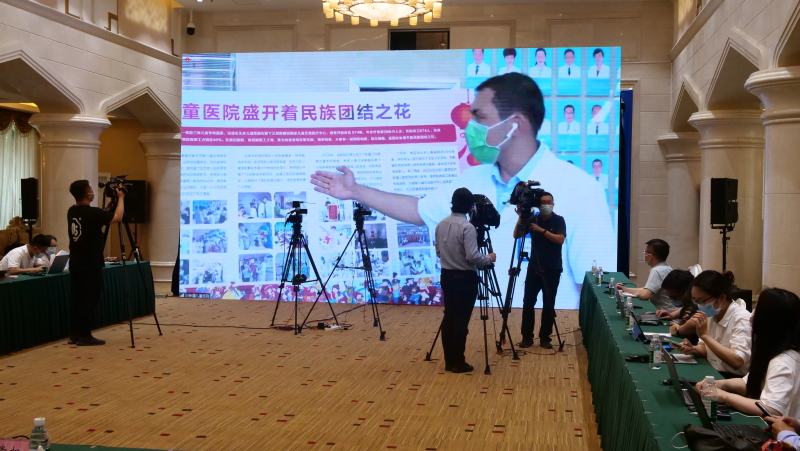
Photo shows Wusman Maimaitti introduces the sitution of the attending physician of neonatal pediatrics carrying out diagnosis and treatment at the grass-roots level in southern Xinjiang. Photo by Xinjiang Daily/Zheng Zhuo
Hematology-oncology department is the first discipline in Xinjiang to carry out the treatment of children's blood system diseases, with a large amount of daily blood consumption. Under the leadership and the active mobilization of Dilimuertti Sregidin, the department's discipline leader and Yao Tong, who is in charge of the department, the staff of all ethnic groups in the hospital and even the family members of the staff all join the team of blood donation for critically ill children of all ethnic groups. Blood donation every year has become the practice of the staff in the department, and everyone is dedicated to the early recovery of children of all ethnic groups with their help.
Abdusaimi Abduraym, the leader of urology, is an excellent expert from ethnic minority. Under the guidance of Professor Sun Ning, a famous expert of Beijing Children's Hospital, Abduraym led the team to carry out 10 new technology and new projects, which expanded the scale of the treatment of difficult diseases, significantly improved the treatment ability of the discipline, and was widely praised by the patients' families.
Luo Xinhui, whose appointment is overcrowded every week, is the pediatric expert and the vice president of the hospital. In order to better treat children of all ethnic groups, president Luo led the establishment of Xinjiang pediatric difficult and critical specialist alliance in 2018. Through this alliance, she has trained grass-roots pediatricians of all ethnic groups in 108 alliance units to actively help grass-roots hospitals treat critical children of all ethnic groups. She often organizes doctors of all ethnic groups in various disciplines to discuss difficult diseases, rounds around the clock to adjust the treatment plan, and the success rate of rescue reaches more than 95%. The children of all ethnic groups cured by her are all over Xinjiang. Some have graduated from college, some have married and have children. Now, we often see patients and their families who come to express their gratitude to her.
In our hospital, there are many stories of ethnic unity and progress like this. These warm and touching pictures can be seen every day in our hospital. Just two days ago, 28 experts and discipline leaders from our hospital and Beijing Children's Hospital held a large-scale free clinic to provide professional services for children of all ethnic groups in Xinjiang, and received a total of thousands of children of patients of all ethnic groups. With the care and support of our country and the autonomous region for Xinjiang Pediatric Hospital, and with 80 experts from Beijing Children's Hospital coming to our hospital every year for hand-in-hand assistance, now the staff of all ethnic groups in the hospital are more united and work harder. Everyone has made great efforts to build our hospital into a national children's regional medical center as soon as possible and work hard to achieve a healthy life for people in Xinjiang.
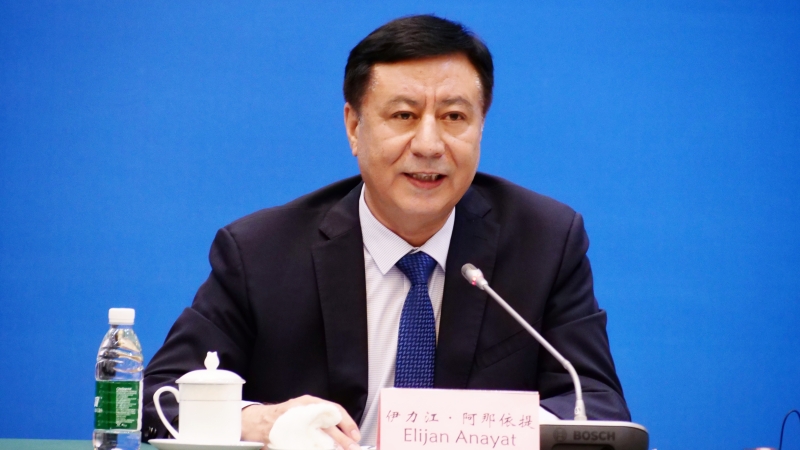
Photo taken on July 22, 2022 shows Elijan Anayat, spokesperson of People’s Government of Xinjiang Uygur Autonomous Region speaks and answers questions at the 78th Press Conference on Xinjiang Uygur Autonomous Region. Photo by Xinjiang Daily/Zheng Zhuo
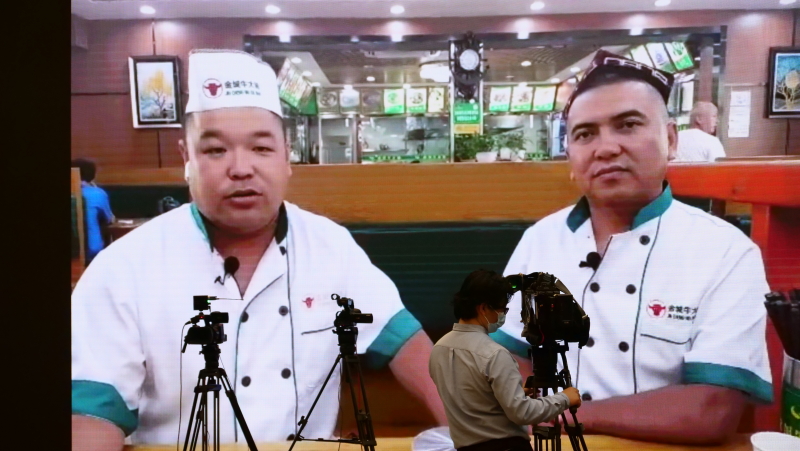
Liang Qiang: Hello, everyone! I’m Liang Qiang, 40 years old. I’m a self-employed businessman in Changji City. This is Mamatjan, my business partner and good brother. In 2005 I came to Changji from Gansu Province and worked together with Mamatjan at a beef noodles restaurant. I pulled noodles and he grilled kebabs. The boss said we were the weight markers of his restaurant. In my view, our relation are like kebabs and noodles that are inseparable from each other.
Mamatjan: Hello, everyone. I’m Mamatjan, growing up in Changji. I’m now Liang Qiang’s business partner. I’m one year younger than him. And he came to work at the beef noodles restaurant one month earlier than I did. Before long I found that he is very hardworking and modest. He didn’t care much at work and he took good care of others. Gradually we became as close with each other as kebabs and lagman noodles and are forever the best team in the circle of Xinjiang delicacies.
Liang Qiang: When I just came to Changji, I was totally new to it. I didn’t go anywhere and simply moved between work place and dormitory. As Mamatjan came to work one month earlier than I did, he took me to eat outside one day as we were off work early. He took me to Ani Barbecue Restaurant that is well-known in Changji. Chatting over kebabs and beer, we felt congenial.
Mamatjan: In May 2010, our former boss didn’t want to run the restaurant any more and persuaded Liang Qiang to take it over. He was eager to do it. Yet he didn’t have much money. I told him as long as he wanted to do it, I would follow him. After a little hesitation, he started to borrow money and the ownership of the restaurant was transferred to him.
Liang Qiang: I was under much pressure at that time. To save money in renovation, Mamatjan and I were hod carriers to the renovator. After much work, the new restaurant was open and I invited Mamatjan to be the kebab chef. At that time, I had no money to hire a worker to help us. Mamatjan was responsible of greeting diners and serving tea and dishes while keeping an eye on grilling kebabs in the front hall. When he was free,he helped me with kneading dough and washing dishes in the kitchen. He was seen where needed.
Mamatjan: At that time, as more and more people came to Changji, our business was getting better. Liang Qiang had the idea of running the restaurant around the clock. At midnight at about four or five a.m he went to the market for meat, vegetables and supplies, in spite of the weather conditions, be it winding, raining or snowing. Afterwards he was busy with kneading dough, preparing for vegetables. He was unable to take a nap until in the afternoon when there were no diners. Only Liang Qiang was tough enough to stand such a tough work.
Liang Qiang: My father and other family members came to Changji from our hometown to see me. Mamatjan took them to tour around and treated them with delicacies in Xinjiang. They were so touched that even today my father urges me to cherish the friendship saying that Mamatjan is my good brother. Mamatjan has also been very hospitable to my friends and fellow townsmen.They all praise him by saying he is a good brother and people in Xinjiang are really nice!
Mamatjan: Sometimes when my mother comes to the restaurant for me, Liang Qiang treats her with delicacies and gives her vegetables and edible oil.He really gives her a lot. In 2013 when Liang Qiang bought an apartment, he persuaded me to buy one too.I did want to buy one, however, I didn’t have enough money for it. Liang Qiang lent me RMB 50,000 and urged me to buy one soon. Putting his arms around my shoulders, he said we are brothers and you may pay back when you have money.
Liang Qiang: In July 2017, we opened the first branch and invested more than RMB 1.3 million.Mamatjan remains to be my business partner. He hired two kebab chefs and I hired 15 employees. Now our Jincheng Restaurant is a big family made up of workers of diverse ethnic groups, including Han, Kazakh, Uygur, Hui and Mongolian.Salaries we pay our employees annually amount to RMB 2 million. In a short span of 16 years, Mamatjan and I have changed from employees to bosses with our own apartments, cars and careers. We plan to open another branch next year.
Mamatjan: In my childhood, our grandfather and father used to tell us, gold, silver or treasure do not mean prosperity and happiness comes from unity and harmony.
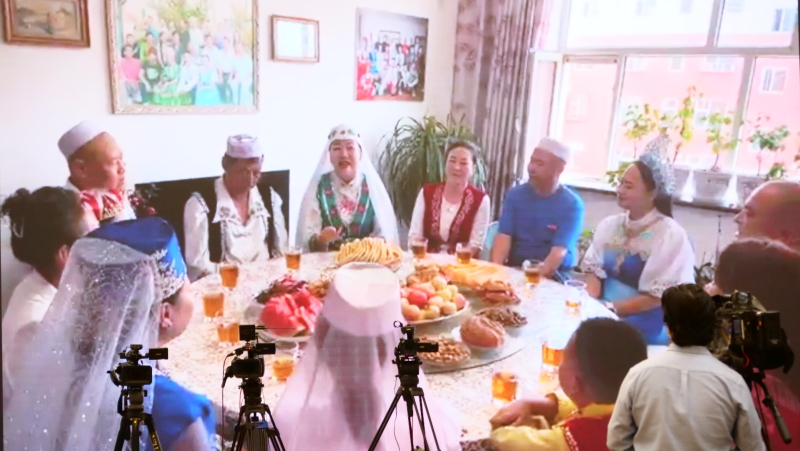
Ma Lianhua: Hello everyone, I’m very glad to introduce my family to all of you through today’s video connection. There are totally 7 nationalities in our family, and all the family members have got married by falling in love self-willingly. With regard to the attitude towards the marriage of their offspring, my parents have always been respectful and inclusive. As long as the young couples are both willing and in good relationship, my parents will support their marriage.
The daughter-in-law of my oldest younger brother is of Kazakh nationality. Our family was poor at that time, so they only had a simple but lively wedding. After getting married, the Kazakh air-dried meat and Naren that she brought soon captured our heart.
The daughter-in-law of my fourth younger brother, Tuhanguli Maimaitti, is of Uygur nationality. In all the years after she got married to him, they have supported each other, and their relationship is going very well.
The daughter-in-law of my fifth younger brother, Wei Zhuqun, is of Han nationality. She’s from Sichuan Province. After the marriage, she also got well with us in a short time.
When my mother was still alive, she often told us that, as a big family, if we all with to enjoy a happy life, then we have to think more about the others instead of ourselves. This has also become our family’s tradition now. Everyone in the family is thinking about one another, helping one another, and we strive to live a good life altogether.
The sweetest “pain” in our family is to celebrate festivals. From spring to winter, we have endless festivals, such as Navruz Festival, Corban Festival, Spring Festival, Mid-Autumn Festival, and we will have festivals in almost every month. As long as a festival has come, there could be countless delicious foods in our family.
We often make jokes that we had almost every Xinjiang cuisine on our table. We have Sanzi, Youxiang, Lieba, Naren, air-dried meat, pilaf, barbecue…We can't tell which nationality's cuisine it might be, but they will just be all over the tops of several tables. At the party in the evening, it will be like a joint performance of culture and art. When Dongbul and accordion are played, someone would sing the song "Lift up Your Veil", then another person will sing the song "Black Walking Horse". We will also do Meshrap and tap dance. The happy atmosphere often made our neighbors couldn't help joining us.
Ma Xiaoning: Hello everyone, my name is Ma Xiaoning and I’m Uygur. Now, I’m in Grade 5 in No.2 Primary School of Tacheng City. I sincerely welcome all of you to my hometown. This is my mother, who’s also Uygur. This is my father, and he’s of Hui nationality. This is my aunt, and she’s Kazakh. My cousin is of Russian nationality. The whole family of mine has 62 people, and you are only seeing some of them now.
Ma Lianhua: This is my niece, Che Hongni.
Che Hongni: Hello everyone, my name is Che Hongni. I’m of Russian nationality. My mother is of Hui nationality, and my father is of Russian nationality. They were classmates. My father started to court my mother first, and they fell in love self-willingly. At that time, my father used to go to my mother’s house. Sometimes he helped my grandmother with some work, while in some other time he would be helping with my grandfather. Quite often, my father even brought some small gifts to grow fondness in them. So, every time when my grandparents saw him, happy smiles would burst in their faces. After he stopped coming for a while, they would begin to wonder whether my father and my mother had quarreled with each other, or why they didn't see him. After getting along for a long time, they knew that my father was a good man, so they agreed my parents’ marriage. After getting married, my parents have been getting along well and they have never run into harsh fights. At the weddings of my brother and me, my parents respected our choices. My husband is of Russian nationality, and my brother’s wife is of Hui nationality. In my mother’s words, despite the nationalities, we are all their children.
Ma Lianhua: This is the daughter-in-law of my fourth younger brother, Tuhanguli Maimaitti.
Tuhanguli Maimaitti: Hello everyone, my name is Tuhanguli Maimaitti, the daughter-in-law of Ma Jinhua's fourth younger brother. Ma Xiaoning is my daughter. You can also see from my daughter that I was very beautiful when I was young. At that time, my husband often took the initiative to chat with me and helped my family do some work. He also gave gifts to my parents. After a long time, my parents thought this young man was good, honest and genuine. I should not suffer hardship if I married him. At first, I was worried that my husband's parents wouldn't accept me. But, it only turned out that his parents liked me at the first sight. After we got married, we worked hard together, and now our life is getting better and better.
Ma Lianhua: This is the daughter-in-law of my oldest younger brother, Kulai.
Kulai: Hello everyone, my name is Kulai and I’m of Kazakh nationality. Our family is very lively now. As long as we get together, there are people who speak Mandarin, Uygur, Kazakh and even Russian. We usually make jokes that our children would learn about so many languages since childhood.
Ma Lianhua: This is the husband of my niece, Cheng Jian.
Cheng Jian: Hello everyone, my name is Cheng Jian and I’m of Russian nationality. In Tacheng, there are so many families like ours. We often say that love makes us a family, and we believe that our children will also continue to pass on this love.
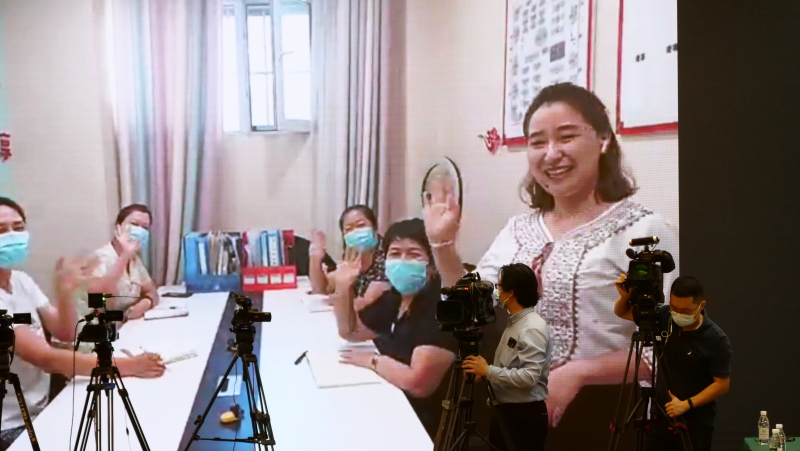
Photo shows Dilidar Utigu (R) shares the stories of ethnic unity via video link at the 78th Press Conference on Xinjiang Uygur Autonomous Region. Photo by Xinjiang Daily/Zheng Zhuo
Dilidar Utigu: North Jishun Road Community in Urumqi was established in July 2012, with 1740 households and 5,219 people of 11 ethnic groups, including Han, Uygur, Hui, Kazakh and Mongol nationalities. My current location is Jixiang Avenue, which is called Ethnic Unity Avenue by the residents of our community. Here, there are many stories of unity. Next, I'll share them with you one by one.
The first story is about our celebration of Spring Festival in our community. Festivals are the busiest time in the community. No matter which nationality's traditional festival it is, the community will be filled with happiness. Spring Festival, Mid-Autumn Festival, Eid al-Fitr Festival, Corban Festival, Navruz Festival, despite their differences in names, everyone would celebrate all kinds of festivals together, and we would also send festival blessings to each other. If a family has fried Sanzi, they would share some with their neighbors. If a family has bought more melons and fruits, they would also share some of them with their neighbors. The community will also hold various cultural and sports activities, and everyone will get together as if we were a family. In the last Corban Festival, our community held an activity for full entertainment with all the residents actively participated in it. The scene was very lively and festive. In Xinjiang, as soon as the music of Meshrep starts, regardless of the old or the young, regardless of nationality, people start to dance.
The second story is about our "Neighborhood Festival". It is said that distant relatives are inferior to close neighbors. Our community has been holding "Neighborhood Festival", which invites everyone to describe the goods in their neighbors and share some warm stories. For example, in May 2019, Ayzez, who was alone at home, fainted after a sudden cerebral hemorrhage. At this critical moment, his neighbor Jian Nanyu rushed over, trotted downstairs with him, and drove him to the hospital. In the hospital, Jian Nanyu helped Ayzez pay the hospitalization fee in advance, and restlessly helped with the hospitalization procedures. Since then, the two families have become as if brothers that shared the same bloodline. Good communication is the key to a good relationship among neighbors. Considering that there are many ethnic groups in our community, and some older residents have some difficulties in communicating in Mandarin, we have built a Corridor of Ethnic Unity. In the evenings of summers, we would get together to enjoy the breeze, play cards and chat with one another. As time goes by, many residents will communicate simply in several languages. The most interesting thing is that, when the community residents greet one another, they will speak Mandarin for some time, then here comes some time for Uygur and Kazak, and then they will even come up with a few words in Mongolian.
The third story is about the Assembly Hall in our community. In such a large community, it is inevitable that residents will fall into some disagreements. What to do if they have encountered such a problem? They will come to the Assembly Hall in our community for discussion. One side illustrates points while the other illustrates theirs, and then they will seek common ground while reserving differences to find the most appropriate solution. The residents will discuss, for example, how to allocate parking spaces, whether the property company is responsible, and some neighborhood disputes can also be resolved here. For example, two residents of our community, Parhatti and Wang Xiaoli, had fierce quarrels with each other because of a cars scratch. The two families insisted on their own words, and they both believed that they were not wrong. Something that didn’t really matter much gave the two families antipathy in their hearts. So, we invited them over in order to learn more about the details of the incident, and we also invited other residents to share their views of it. Finally, the two families felt that they had both done wrong, and then they apologized to each other and became good friends. They also cooperated to open an agritainment. Parhatti is good at barbecue, and Wang Xiaoli is good at business planning. Their business is thus booming now.
Finally, I want to share with you a concept that all residents of North Jishun Road Community have always adhered to, which is, ethnic unity is our lifeline, and we know that only unity can make our life better. Only unity can make our hometown better and better. As long as we hold tight to one another, our tomorrow will be better.

Ahmat Ger: Good afternoon, everyone! My name is Ahmat Ger. I’m a farmer from Yongku Tuanjie Village, Qiman Town, Kuqa City. Our village was previously named Momatiraq, which means a tree in Uighur. Thanks to the assistance of the government of Ningbo City, Zhejiang province for the past few years, our village has become a well-known site for tourism where local residents are living a happy life. In order to commemorate the friendship between Kuqa and Ningbo, we changed our name to Yongku Tuanjie Village, in which Yong stands for Ningbo while Ku for Kua City, and Tuanjie refers to solidarity in Chinese.
There are Uygurs and Han people in our village. Neighbors help each other like a family. Ethnic unity is our glorious tradition. We have been reminded now and then by those old people that brothers in unity can achieve anything together but can’t even afford a Naan when in disunity.
My father passed away early when I was young, so it was difficult for our family. My sister and I often went to my neighbor Sun Chengzhong's house for dinner. After a long time, we took him as our own father, and we all called him "dad Sun ". Father Sun treats us as his own children. We eat and dress the same as his children. When he has money, he buys us new clothes. When it's difficult, we share our clothes with each other.
When I was about to get married in 1995 but my family was still struggling with our lives, father Sun gave me 5,000 yuan without second thought. To help my own family gain wealth, he even bought me a tractor. Although I turned 49 years old with my own children, he still treats me like a child and keeps nagging like “do not develop the drinking habits, and work hard”. Even with the wheat and cotton I grow, he would tirelessly remind me of when to start sowing or disbudding.
With the advent of spring sowing season in 2008, father Sun accidentally fell off his motorcycle and broke his leg. I dashed to the hospital to see him upon awareness of the accident. I expressed willingness to stay to look after him, but he disagreed and said “if we fail to ensure seeding as planned, we could end up in vain at the end of the year. Hurry up and go back to sow!” I replied, “it doesn’t matter since the land can await sowing next year. However, your leg injury will never be cured if you are not being taken good care of”. So, I stayed at the hospital to look after him and didn’t return home until he could perform off-bed activities on his own.
If you ask me how ethnic unity is reflected. I will tell you this: ethnic Han and Uygur are exactly the same. They are two children of their shared parents. The Chinese nation is like a big family in which different ethnicities represent seeds of a pomegranate that bond closely together. And together, we are striving to build our beautiful home and embrace our bright future.
Zelyhan Sharamu: Good afternoon, everyone! My name is Zelyhan Sharamu. My hometown, Keping County, is an extremely beautiful place. It used to an important courier station along the Silk Road, which boasts time-honored history and unique natural scenery. We welcome friends to tour around here. Keping County is home to varied ethnicities including the Uygur, Han, the Kirgiz and the Hui. We work and study together and live in harmony like a big family.
My predestined story with an infant from Wuhan started from 2019. On an autumn day that year, I participated in blood donation organized by the Red Cross Society of Keping County. The staff on site introduced to me the possibility of saving patients’ lives by donating stem cells. Then I thought perhaps my efforts could help save others’ life and even the destiny of an entire family. That would be of significance. So I decided to join the volunteer team dedicated to donation of stem cells.
In May 2021, I was notified by the staff of Red Cross Society of the successful match with a patient from Wuhan, who is an infant of less than one year old. At first, I was quite nervous and afraid that my donation wouldn’t work if I was unable to feed myself with adequate nutrition, thus disappointing the baby’s family. Under the guidance of Red Cross personnel and doctors from our county hospital, my family made a full preparation the following month. I kept doing exercises everyday and my mom cooked chicken soup and stewed lamb for me since it was the expectation of everyone in our family to witness a successful story by helping the infant survive.
On June 17, I completed the donation of stem cells. The doctor told me everything went well and those cells could definitively be of use. I was lying in bed and it occurred to me that my stem cells must already be aboard the plane heading towards Wuhan, reaching the little baby. With all my heartfelt care, he will definitively grow up healthy and sound. His family must be exceptionally happy about it.
Later, the Red Cross staff told me that the baby recipient who came from a family of ethnic Han was in good conditions. It was a quite relief for me to hear such news since all my efforts counted. Now I’ve got married and had a child of my own. Sometimes, when I look at my child, the kid from Wuhan that I never meet in person would pop up on my mind. I hope he is living a healthy and happy life.
As the first donor of stem cells in Keping County, I’ve won the praise from many people as a model of ethnic solidarity after they heard my story. I feel really proud and believe it’s something that should be done. Similar stories are countless in our neighborhood. As brothers and sisters, different ethnic groups should give a helping hand to each other whenever in need because life should be this way.
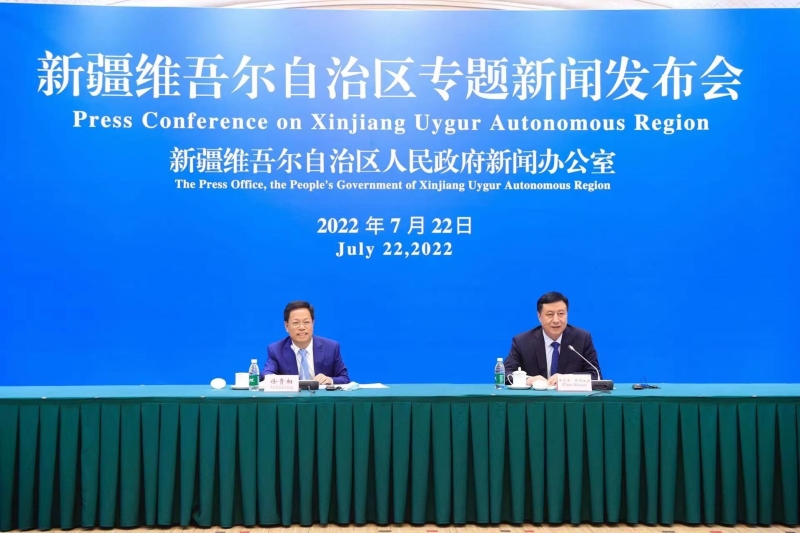
Photo taken on July 22, 2022 shows the 78th Press Conference on Xinjiang Uygur Autonomous Region. Photo by Xinjiang Daily/Zheng Zhuo
Xu Guixiang: Dear reporters, distinguished guests, the above nine representatives of the people of all ethnic groups vividly showed us the story of the unity of all ethnic groups in Xinjiang living, working, growing happily together from different levels and fields, and vividly displayed the moving scene of the people of all ethnic groups in Xinjiang working together and prosperity and development in the great family of the Chinese nation. Next, I will have an interactive exchange with all media reporters. Welcome to ask questions.
MASTV: Recently, the popularity of tourism in Xinjiang hit the ranks of hot searching. There are more people than sheep on the grassland, it is difficult to find a guesthouse, and there is a traffic jam on Dushanzi-Kuqa Highway, etc. So I wonder how Xinjiang views this tourism boom? What does the spokesperson think is the reason for this boom? In addition, under the condition that the current epidemic will still happen occasionally, what has Xinjiang done to improve the tourism reception capacity and ensure the fairness and stability of the tourism market? Also, can the prosperity of Xinjiang's tourism market be seen as another response to the pressure of the United States and Western countries to discredit Xinjiang?
Elijan Anayat: Ⅰ. Reasons for the great tourism boom in Xinjiang
Xinjiang, with magnificent mountains and rivers, profound cultural heritage, abundant historical relics and rich ethnic customs, is the province with the most complete types of tourism resources, the largest number of high-quality tourism resources and the greatest potential for tourism resource development in China.
Up to now, the number of A-level tourist attractions in Xinjiang has increased to 639. Among them, there are 17 national tourist attractions with 5A-level ratings, ranking among the top three in China. A number of domestic first-class and world-class tourism business reputation, such as national all-around tourism demonstration areas, tourism resorts, ski tourism resorts, have become new landmarks for tourists' itinerary, Instagram influencers, and variety shooting.
The tourism environment and management level in Xinjiang have been upgraded, and the problems of "three difficulties and one obstacle" have been continuously rectified, and the construction of tourism related infrastructure, public service facilities and smart tourism has been increasingly improved. The "Travel to Xinjiang", "Smart Tourism Management Platform" and "Tourism Statistics Big-data Platform" have been launched online, and the "Smile Xinjiang" action has been carried out in depth. The quality of tourism services in Xinjiang and the comfort and satisfaction of tourists have been improved in an all-round way.
A large number of major investment projects have landed in Xinjiang, and the industrial competitiveness has continued to strengthen, and the tourism industry has continued to transform and upgrade. In 2022, 412 key investment projects in the cultural tourism industry have been sorted out, with a total investment of 182.753 billion yuan.
Xinjiang coordinates epidemic prevention and control, economic and social development, overall development and security, takes the lead in issuing the "eight measures", holds a tourism development conference, carries out rich and colorful cultural and tourism activities to benefit the people, carries out three-dimensional precision marketing, promotes the revitalization of tourism in Xinjiang and the introduction of tourists from outside Xinjiang, and fully accelerates the recovery of tourism.
According to the comprehensive calculation of the third party through the big-data platform of tourism statistics and sampling survey: in June 2022, the region has received 23.9226 million tourists, a year-on-year decrease of 10.49%, and an increase of 66.39% month on month in May; the tourism revenue has reached 17.412 billion yuan, a year-on-year decrease of 12.97%, and an increase of 89.69% month on month in May. From July 1 to 21, the region has received about 25.54 million tourists, an increase of 15.70% over the same period last year; an the tourism revenue is about 19.1 billion yuan, an increase of 16.67% over the same period last year.
In short, the boom of tourism in Xinjiang is the result of the superposition and continuation of policies such as the continuous release of Xinjiang's stability dividends, the scientific and accurate epidemic prevention policies in accordance with the law, the steady promotion of the cultural embellishment project and the tourism strategy to revitalize Xinjiang. It is also the result of people's general hope to relax in Xinjiang under the epidemic. The formation of this good situation is hard won, and we need to maintain and care for it together.
II. Reasons for traffic jams on Dushanzi-Kuqa Highway
Dushanzi-Kuqa Highway is also called the national Highway 217, with a total length of 561 kilometers and a north-south trend. It starts from Dushanzi District of Karamay City in the north, crosses the middle part of Tianshan Mountains, runs north- south through Tianshan Mountains, and connects Kuqa City of Aksu Prefecture in the south. It is a famous tourist highway. Along the way, there are many scenic spots such as Qiaoerma Scenic Spot, Nalati Grassland and Bayanbulak Grassland, as well as unique natural landscapes such as the red-brown Mysterious Grand Canyon of Tianshan Mountains and Tielimaiti Pass, making travelers feel the magical changes that weather in four seasons can be experienced in one day, which can be felt at a distance of ten miles. The unique natural landscape and profound cultural heritage attract a large number of self-driving travel enthusiasts and avid hikers,but due to the influence of the season, Dushanzi-Kuqa Highway only opens to traffic for four or five months every year. As there are gobi, grassland, lakes, snow mountains, glaciers, canyons and other landscapes along the way,it was rated as " a landscape road stretching across the spine of Tianshan Mountains " by Chinese National Geography.
July 9 was just when the peak tourist season came,coinciding with the eve of the Corban Festival holiday. According to the statistics of the traffic police department of the public security department, the vehicle volume of Dushanzi-Kuqa Hinghway reached 28,000 on that day, more than five times the designed road capacity which can contain 5,400 vehicles. Due to the sudden increase in traffic flow, the problem of vehicle congestion and slow movement became prominent. In view of this situation, the Party Committee and government of the Autonomous Region attached great importance to it and made arrangements. First, the relevant departments of public security, transportation, emergency response, culture and tourism immediately launched contingency plans, released early warning information in a timely manner, and issued early warning information about the carrying capacity of holiday scenic spots and road traffic conditions through various media. Second, responsible comrades of Party Committees and governments along Dushanzi-Kuqa Hinghway rushed to the scene to dispatch and command, took measures such as traffic restriction, diversion and publicity to divert tourists, which timely dealed with emergencies and provided help to tourists. For example, Ili Kazak Autonomous Prefecture, Karamay, Aksu and other prefectures or cities have mobilized volunteers to provide tourists with medical assistance, road information consultation, and free deliveries of yogurts, watermelons, naan breads, mung bean soup and pure water. Third, the public security department strengthened the dispatch, organized traffic police from the traffic police brigade along the line each place (the prefecture, the city) to work diligently at full load to ease the traffic. Fourth, cultural and tourism administration departments at all levels arrange major responsible persons to be on duty and go deep into the front line to take the lead in strengthening emergency guard and emergency response. After taking the above measures, the problem of congestion and delay on Dushanzi-Kuqa Hinghway was solved that night and normal traffic resumed the next day.
At present, the supply of culture and tourism market in our region is abundant, stable and orderly. Welcome to extremely gorgeous Xinjiang for sightseeing, vacation and leisure.
Xu Guixiang: The United States and other Western anti-China forces have maliciously smeared Xinjiang's image, but the brand of “Xinjiang is a Wonderful Land” is getting more and more conspicuous. Tourism in Xinjiang is booming, with many tourists from home and abroad praising the economic and social development of Xinjiang and the beautiful life of its people. This shows that the rumors and lies fabricated by anti-China forces in the US and the West have no market and cannot deceive the international community. More and more people have seen through their intrigues, fallen in love with the extremely gorgeous Xinjiang, and justified Xinjiang's name,which are positive actions, voices of justice, and powerful responses to the anti-China forces of the United States and the West!
Phoenix TV: In terms of the sharp increase in the number of tourists in Xinjiang this summer vacation, what is the reason? Some tourists also said that the surge in the number of tourists has greatly reduced the sense of experience, and some even joked that the Dushanzi-Kuqa Highway has become a "crying highway". What measures will Xinjiang take to improve the comprehensive service level in the next step?
Xu Guixiang: In order to further improve tourism in peak season, on the premise of scientifically and accurately implementing normalized epidemic prevention and control measures according to law, Xinjiang will continue to strengthen the flexible supply capacity of hot tourist attractions, and strictly implement the measures of "limiting, reserving,and off-peak". At the peak of tourists' travel, increase ticket windows, increase transport capacity guarantee, implement the maximum carrying capacity early warning system. The second is to increase the publicity and promotion of relatively "unpopular" scenic spots and scenic roads such as S101, G219 and Yizhao Highway, as well as 10 ancient Silk Road tourism routes such as Cheshi Ancient Road, Tasha Ancient Road and Wusun Ancient Road, to further enrich the supply of tourism products and give tourists inside and outside the district more choices. The third, is to vigorously carry out the "Smile Xinjiang" service quality improvement action, standardize the order of tourism market operation, strengthen law enforcement supervision, and guide tourists to travel in a civilized and safe way. The fourth is to focus on creating a four-seasoned tourism brand of "enjoying flowers in spring, enjoying the cool weather in summer, enjoying picking in autumn and playing snow in winter" to make Xinjiang a peak tourism season all year round. The fifth is to focus on epidemic prevention and control and safe production to ensure safe and secure travel.
Hong Kong Sing Tao Daily: During President Xi's visit to Xinjiang, he did not mention too much of the "anti-terrorism" topic,but emphasized more on cultural and economic construction and ethic unity. Does it mean that the large-scale anti-terrorism in Xinjiang has come to an end, and the future center will focus on the development of the economy and people's livelihood?
Xu Guixiang: From July 12th to 15th, Chinese President Xi Jinping, also general secretary of the Communist Party of China (CPC) Central Committee and chairman of the Central Military Commission, visited Xinjiang for investigation and research again after 8 years. He took the pulse and steered the direction of Xinjiang from the perspective of strategy and overall situation, and injected strong political, spiritual and work impetus into our work in Xinjiang. People of all ethnic groups in Xinjiang are greatly encouraged and heartened.
We deeply realize that to do a good job in Xinjiang must firmly adhere to the general goal of social stability and long-term stability, fully and accurately implement the party's strategy for governing Xinjiang in the new era, coordinate development and security, comprehensively promote the normalization of the rule of law for anti-terrorism and stability maintenance, gradually realize the overall social situation from "chaos to stability" to "stability to governance", adhere to the general tone of seeking progress in stability, comprehensively deepen reform and opening up, lay a solid foundation for social stability through reform and development, realize the benign interaction of the two.
If there are no other questions, this press conference ends here. Thank you all.









